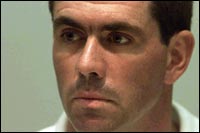Cronje's life ban challenge in court next week
Cricket's campaign against match-fixing will face its toughest test yet when Hansie Cronje challenges his life ban in court next week.
Cronje was banished from all forms of organised cricket after admitting to the King commission last June that he had colluded with the game's gambling underworld and had accepted approximately $130,000 in cash.
Next Wednesday, Cronje and the United Cricket Board (UCB), which banned him, will square up in the Pretoria High Court as the ex-South African captain takes on his former employers in an attempt to have his ban overturned.
Cronje's case will be argued in court by senior counsel Mike Maritz, who has earned a reputation for fiery cross-examination.
Senior counsel Wim Trengove, who has previously represented former president Nelson Mandela and the country's Truth and Reconciliation Commission, is to argue for the UCB in front of presiding judge, Justice FC Kirk-Cohen.
 Cronje has expressed a desire to return to the game he wronged in a non-playing capacity, possibly in a coaching or media role.
Cronje has expressed a desire to return to the game he wronged in a non-playing capacity, possibly in a coaching or media role.
But the UCB are determined to keep him away from all cricket played under their auspices, which involves international, provincial, club and school competitions.
All that is left for Cronje under the ban is private coaching. He is unlikely to be granted media accreditation by the UCB, which will limit but not preclude his opportunities to report and commentate on cricket.
ECONOMIC RESTRAINTS
Cronje's lawyers are expected to argue that the ban places unfair economic restraints on their client and that he could still be of use to the game. Another significant argument will likely be that the UCB took action against Cronje without granting him a hearing.
However, granting Cronje restitution so soon after his fall from grace --- the scandal broke in April last year -- could send a signal to corrupt cricketers and cricket's corrupters alike that the coast was clear and they could resume their activities, some say.
Match-fixing has been investigated in every test-playing country, apart from England, but the South African inquiry has been hailed as the most thorough attempt yet to come to terms with the extent of the problem.
The cricket world watched in shock and amazement as Cronje, Herschelle Gibbs and Henry Williams told the King commission of their roles in the betting scandal. Gibbs and Williams were fined and banned for six months each after a UCB hearing, while Cronje was banned for life on the strength of the evidence before the commission.
The commission shed light on an illegal industry said to be worth millions of dollars a year and it led to the International Cricket Council (ICC) forming an anti-corruption unit headed by former London Metropolitan Police chief Paul Condon.
SIGNIFICANT SWITCH
That in itself represented a significant shift from the soft-handed approach cricket's authorities had taken towards match-fixing, which had been known of for decades but not dealt with.
The work would be undone if Cronje's ban was lifted, critics say. It would also bring the UCB into direct opposition with the ICC, which also banned Cronje, and could, in theory, lead to South Africa being excluded from international cricket.
Meanwhile, Cronje, who is not expected to attend the court proceedings, is ensconced in his luxury home on Fancourt golf estate in George. He kept a low profile for a year after tumbling into disgrace but during that time reportedly earned 10 million rand ($1.15 million) from granting media interviews.
Recently, Cronje has made public appearances and delivered speeches at private functions and business breakfasts in what has been seen as a charm offensive in the lead-up to his court case. He has expressed his regret, admitted he erred and said he wants to get on with the rest of his life.
However, Cronje's positive outlook was nowhere to be found when, in July, he reacted with rage to newspaper reports that a forensic audit had discovered he had 19 different banking accounts and once owned eight properties, and that the commission wanted to question him on the matter.
"That money came from the sale of my house in Bloemfontein and I don't know why I have to explain that to anyone," Cronje said in a radio interview when asked about a large deposit into one of his accounts.
Mail Cricket Editor
(C) 2000 Reuters Limited. All rights reserved. Republication or redistribution of Reuters content, including by framing or similiar means, is expressly prohibited without the prior written consent of Reuters. Reuters and the Reuters Sphere logo are registered trademarks and trademarks of the Reuters group of companies around the world.